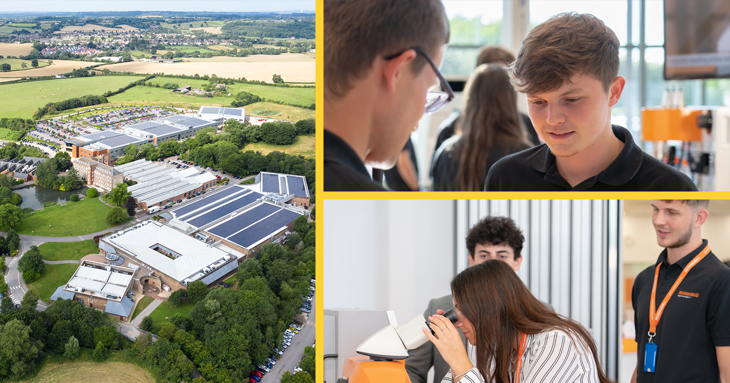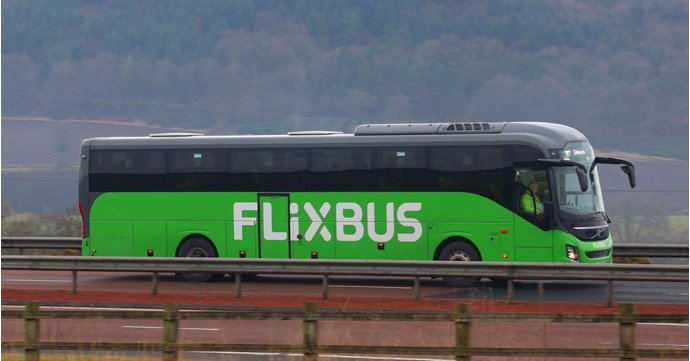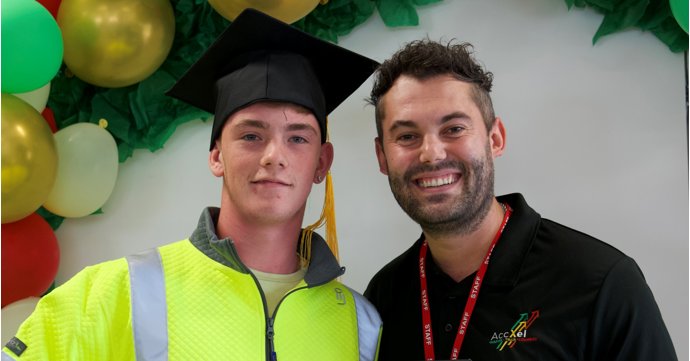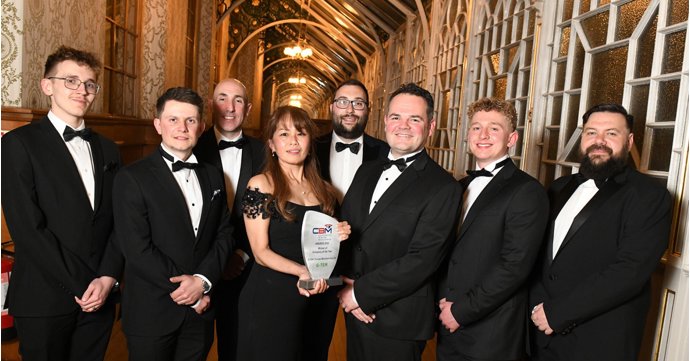Global engineering giant, Renishaw, has an immense reputation for its successful apprenticeship programme. The firm has been supporting graduates and early careers participants throughout most of its 50-year history, with its latest cohort officially starting in September 2023.
Catching up with SoGlos, senior early careers resourcing and programme advisor at Renishaw, Julia Russell, chats about plans for encouraging diversity, the success stories from its early careers programmes and its continued commitment to apprenticeships.
Why are apprenticeships so important to Renishaw?
Well, we've been running our apprenticeship scheme for almost as long as the business has been around and we've got the pedigree of our founders Sir David McMurtry and John Deer — they both started their careers as apprentices — so clearly it works!
Some of the members of our key senior team have come up through the apprenticeship scheme as well. In fact, one of our senior managers described the early careers scheme as being 'the lifeblood of the company', which is why we're so absolutely committed to continuing to take people on in large numbers.
Renishaw also understands that through the scheme we're giving something back as well as to the industry — and to the country — in terms of bridging skill gaps. I think our team also appreciate the fact that we've got young talent coming in and there's a huge amount asked of them. We get to see them mature and develop across their journey and everyone has a part to play in that.
Everyone across the team benefits from witnessing their development, their positivity and them achieving milestones, and their success obviously brings that back to the business, thus Renishaw continues to be a success and we all benefit from that.
How do you measure the success of your apprentices at Renishaw?
The best way I can illustrate the level of accomplishments of our apprentices is by referencing a few standout stories that come to mind. For instance, one of our level six embedded apprentices was made responsible for an independent investigation into display technology, where he was able to learn the technology on his own to the point of becoming an expert in his division and acquiring the opportunity to present the results to the divisional management team — he went on to have his placement extended for another six months.
Another one of our level three manufacturing apprentices was placed in the quality assurance team, during which he was presented with an assembly production calibration issue. The manager on-site mentioned that this was a task which in hindsight would be difficult for many experienced engineers. The apprentice not only successfully delivered a new method and testing validation, but they also surpassed all expectations in both the quality of their work and their work ethic.
How are the apprentices guided through the programme at Renishaw?
We don't currently have a formal mentorship programme for apprentices, we rely on our stream coordinators who will look after a particular apprenticeship scheme, as well as placement managers and our early careers teams. We find it helps to encourage our apprentices to be fully integrated within our workforce, and to be able to ask anyone they're working with for help and assistance, just like a regular member of staff, so that they truly feel like part of our team.
To facilitate that, we have a wealth of knowledge within our team of engineers, who love to share that knowledge, so they naturally make brilliant mentors and can act as someone to go to and speak to while on placement.
We work with a number of providers including the Universities of Exeter and Coventry, but we also have good links with local providers including Gloucestershire College, The University of Gloucestershire, South Gloucestershire and Stroud College and Gloucestershire Engineering Training, who help us to deliver excellent training on the theory side as well.
Are you currently hiring apprentices?
We are currently recruiting around 60 apprentices across the engineering, digital and maintenance departments within Renishaw. There are a variety of programme lengths, some can be completed in 12 months, some embark on a four- to five-year journey. We offer schemes from level two up to level seven, which is very advanced. For the 2024 intake, we are focusing on levels three to six and our apprentice recruitment scheme launches on Monday 3 December 2023.
Potential applicants can also get a feel for our training and working facilities by visiting our New Mills site on Tuesday 12 December 2023 for our open evening, and more details for that will be available on our website soon.
Applicants can visit our website and they'll be redirected to the Graduate Recruitment Bureau page where they will create their application. If they are shortlisted, they'll then be contacted to answer a few questions before being invited to an interview or to attend an assessment centre, depending on the scheme they've applied for. Assessment centres allow us to see lots of candidates in order to assess what their level is, what their maths skills are like, whether they're particularly dextrous, that sort of thing.
They can also speak to former apprentices at the centre and there's a tour of the site — all in all, it's designed to be a nice experience rather than an intimidating one.
What are some of the challenges you face when recruiting apprentices?
I think that the UK government could do much more to push for apprenticeships, but aside from that, I think it's still a real challenge to get people to understand what an apprenticeship actually is. We're still having the same challenges getting through to parents as well as schools that we've been having for over a decade in tackling the mentality that you have to go to university.
A lot of people don't understand, or perhaps don't realise, that our degree apprenticeships are the same degrees that are available at university. Yes, it takes a bit longer because you're getting all this other experience on the job that you wouldn't get on a university course.
We just want to get across that message that an apprenticeship is not a 'poor' or 'lesser' alternative. This is a valid career choice and I really hope people really consider this when they are making their career choices.
What do you look for when recruiting apprentices? What are some of the key desirable traits?
That's a bit hard to pin point because, when we think of an apprentice, they're really very raw when it comes to life experience — so what we're really looking for is potential.
They may need to have certain grades in particular subjects to do a degree apprenticeship, but there's no clear answer because we actually really like the unique differences that each one brings. We want to encourage a diverse workforce and we want all of those different types of people with different skills levels.
We want people who are going to question our processes and take a step back and go, 'why are you doing it like that?' We want out-of-the-box thinkers.
You mention diversity in the workforce, how is Renishaw working to ensure this?
This year we employed an equality, diversity and inclusion (EDI) lead, which is a brand-new role for us. We also have EDI champions as well as an EDI panel. We're also putting a larger focus on Pride Month and Black History Month and showing our support for those communities.
As far as the apprentice scheme, we admit there's more work to do. I think this comes back to trying to get people to understand that it's okay to do an apprenticeship over a degree and that stems all the way back to schools. But we do have an education outreach team who work hard when visiting schools across Gloucestershire and the wider south west region, to promote apprenticeships.
We also host female-only work experience days at Renishaw — those sorts of targeted methods of promotion will hopefully improve diversity and inclusion, not just at Renishaw, but in the wider engineering sector.
What would you say to other businesses considering hiring apprentices?
I would say definitely do it. Have an open mind about ways you can get people into your business. But a key thing for employers to realise is that apprenticeships have to be meaningful. It's not just a case of getting a trainee and they'll sweep the floor and make cups of tea. Thankfully, those days are gone!
This is now a valuable investment into an individual who is going to bring something fresh to your business, so make sure you can support them — and the satisfaction from working with these young people is brilliant. You get to see them grow and improve, and hopefully they'll go on to contribute to the business for years to come, like we've seen at Renishaw. It's a big commitment, but it gives back much more than you initially put into it.
People just need a chance and an opportunity and we've found it's always worth supplying that opportunity.




















